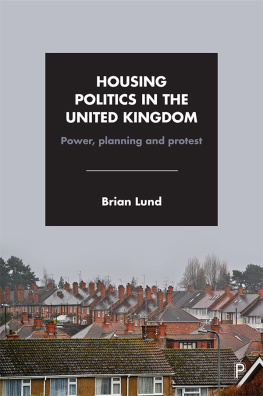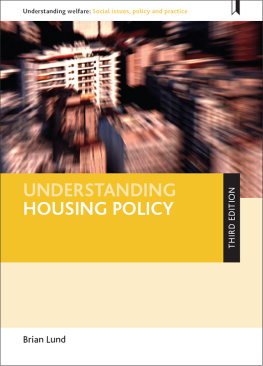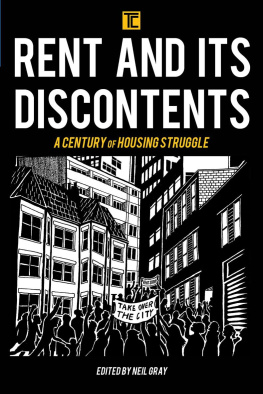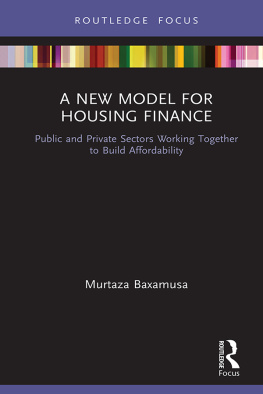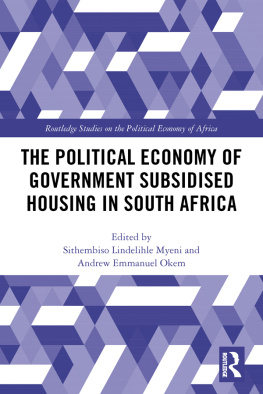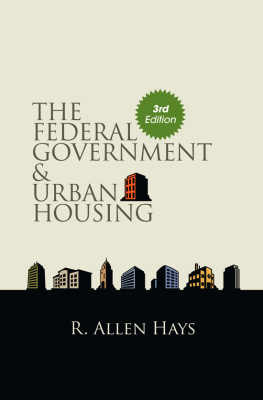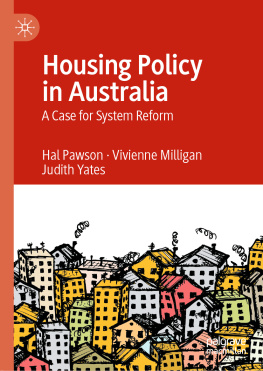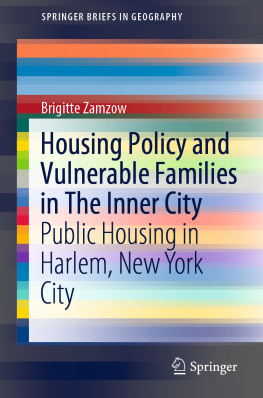HOUSING POLITICS IN THE
UNITED KINGDOM
Power, planning and protest
Brian Lund
First published in Great Britain in 2016 by
Policy Press University of Bristol 1-9 Old Park Hill Bristol BS2 8BB UK Tel +44 (0)117 954 5940 e-mail
North American office: Policy Press c/o The University of Chicago Press 1427 East 60th Street Chicago, IL 60637, USA t: +1 773 702 7700 f: +1 773-702-9756 e:
Policy Press 2016
British Library Cataloguing in Publication Data
A catalogue record for this book is available from the British Library
Library of Congress Cataloging-in-Publication Data
A catalog record for this book has been requested
ISBN 978-1-4473-2707-3 hardcover
ISBN 978-1-4473-2708-0 paperback
ISBN 978-1-4473-2711-0 ePub
ISBN 978-1-4473-2712-7 Mobi
ISBN 978-1-4473-2710-3 ePdf
The right of Brian Lund to be identified as author of this work has been asserted by him in accordance with the Copyright, Designs and Patents Act 1988.
All rights reserved: no part of this publication may be reproduced, stored in a retrieval system, or transmitted in any form or by any means, electronic, mechanical, photocopying, recording, or otherwise without the prior permission of Policy Press.
The statements and opinions contained within this publication are solely those of the author and not of the University of Bristol or Policy Press. The University of Bristol and Policy Press disclaim responsibility for any injury to persons or property resulting from any material published in this publication.
Policy Press works to counter discrimination on grounds of gender, race, disability, age and sexuality.
Cover design by Hayes Design
Front cover image: Getty
Readers Guide
This book has been optimised for PDA.
Tables may have been presented to accommodate this devices limitations.
Image presentation is limited by this devices limitations.
Contents
Acknowledgements
Thanks are due to a number of people who have contributed to the publication of this book. I am greatly indebted to Policy Press staff for their help. My more personal gratitude is to Sukey, Rachel, Daniel, Carly, Bethany and Max for their continual support and encouragement. Although I would like to, I must not forget Stanley, a ferocious cat.
Preface
Housing has been labeled a wicked problem: complex, territorial, open-ended and intractable. Housing Politics in the United Kingdom: Power, Planning and Protest underscores the role of politics in generating this wickedness, highlighting the actors involved in the political process and the entrenched territorial electoral politics involved in the housing question. It concentrates on preparing, disputing and implementing policy rather than on policy outcomes and the social and economic determinants of continuity and change.
Its subtitle reflects the books themes. Power is acquired formally through the electoral system but is exercised through a variety of mechanisms, including governmentality the techniques that regulate and order the peoples behaviour. Planning draws attention to attempts to modify the role of markets in housing outcomes and includes land-use planning and the influence of alleged rational solutions applied to the housing problem. Protest concerns the outsiders in the political system and their attempts to secure a voice and perhaps eventually become the power-holders.
sets out the books principal themes, outlining the major theoretical approaches framing the content of Housing Politics in the United Kingdom: Power, Planning and Protest: the new institutionalism, social constructionism and public choice theory.
reviews the territorial politics of urban renewal, with its strong connections to campaigns for the preservation of rural Britain.
chronicles private landlordisms fall and rise analysing the role of protest movements and internal and external class conflicts in the demise of private landlordism and the political implications of the recent rapid increase in the number of people joining generation rent.
, the fluctuations in the political base of local authority housing, once the major rival to homeownership as a replacement for private landlordism, are charted.
explores devolutions impact, asking not only Where is the difference?, but also What political factors have created the differences?.
, organised on the themes of power, planning and protest, reviews the political factors that have shaped housing policy and examines the contemporary politics of housing.
References to Cabinet papers and political biographies feature prominently in the book and there is an abundance of actor names. Ideas are important in both the political communiqus that influence the electorate and interactions between those in power.
Housing Politics in the United Kingdom: Power, Planning and Protest has been written to complement the third edition of Understanding Housing Policy, to be published in 2017, which adopts a more conventional approach, concentrating on housing policy outcomes.
ONE
Housing and politics
With rapid population growth, a long-term dearth in new housing construction, generation rent, greenfield and green belt controversies, the austerity agenda, and increasing homelessness, housing had a higher political profile in 2015 than at any time since the 1970s. When the 2015 general election hustings began, housing ranked eighth in the issues mentioned by electors as the most important facing Britain today and its importance reached fifth place just before the election (Ipsos Mori, 2015a). The London Evening Standard (2015) said housing is the big election issue for London, and Shelter claimed that marginal seats nationwide were more likely to be worse affected by the housing shortage, especially when it comes to the affordability of home ownership (Shelter, 2015a, p 1). However, political parties contest general elections in vivid colours, and after the election result declaration, it was clear that non-policy issues, such as leader competence and a perceived threat to England from the Scottish National Party, had a major impact (Ross, 2015; Cowley and Kavanagh, 2016). Housing was not significant in influencing the overall 2015 general election outcome.
In contrast, housing was the overwhelming public concern in the 1945 general election campaign. In a 1945 Gallup poll, 54% of the electorate said the housing shortage was their top priority, well above the second concern, full employment, at only 13% (British Institute of Public Opinion Polls, 1945). A Mass Observation study carried out just before polling day claimed that housing was mentioned so often that everything else became by comparison unimportant (Jones, 2000, p 100). Few houses had been built in the wartime years and the destruction or serious damage to 700,000 homes added to unmet needs in the interwar period. Demobbed soldiers, organised by the Communist Party through a secret committee of ex-servicemen known as the Vigilantes, began to squat in empty property and disused army camps. Labours 1945 manifesto promised to proceed with a housing programme with the maximum practical speed until every family in this island has a good standard of accommodation. New housing would be planned and allocated according to need, with the central state controlling building materials and with new powers available to local government to acquire land for public purposes wherever the public interest so requires (Labour Party, 1945). The electorate supported Labour, with twice as many people believing that Labour was more likely to overcome the housing shortage than the Conservatives (Fielding, 1992).

